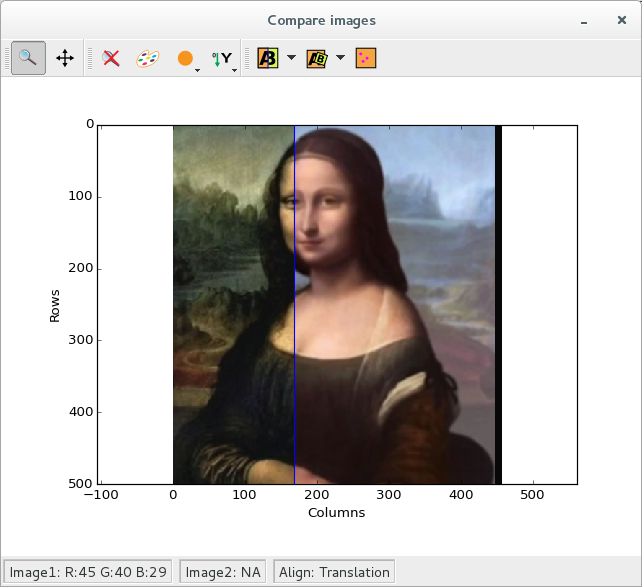CompareImages: Plot 2 images to compare them#
A widget dedicated to compare 2 images.

CompareImages class#
- class CompareImages(parent=None, backend=None)[source]#
Widget providing tools to compare 2 images.

- Parameters:
parent (Union[qt.QWidget,None]) – Parent of this widget.
backend (str or
BackendBase.BackendBase) – The backend to use, in: ‘matplotlib’ (default), ‘mpl’, ‘opengl’, ‘gl’, ‘none’ or aBackendBase.BackendBaseclass
- class VisualizationMode(value, names=<not given>, *values, module=None, qualname=None, type=None, start=1, boundary=None)#
Enum for each visualization mode available.
- class AlignmentMode(value, names=<not given>, *values, module=None, qualname=None, type=None, start=1, boundary=None)#
Enum for each alignment mode available.
- sigConfigurationChanged#
Emitted when the configuration of the widget (visualization mode, alignment mode…) have changed.
- getPlot()[source]#
Returns the plot which is used to display the images.
- Return type:
silx.gui.plot.PlotWidget
- getRawPixelData(x, y)[source]#
Return the raw pixel of each image data from axes positions.
If the coordinate is outside of the image it returns None element in the tuple.
The pixel is reach from the raw data image without filter or transformation. But the coordinate x and y are in the reference of the current displayed mode.
- Parameters:
x (float) – X-coordinate of the pixel in the current displayed plot
y (float) – Y-coordinate of the pixel in the current displayed plot
- Returns:
A tuple of for each images containing pixel information. It could be a scalar value or an array in case of RGB/RGBA informations. It also could be a string containing information is some cases.
- Return type:
Tuple(Union[int,float,numpy.ndarray,str],Union[int,float,numpy.ndarray,str])
- setVisualizationMode(mode)[source]#
Set the visualization mode.
- Parameters:
mode (str) – New visualization to display the image comparison
- setAlignmentMode(mode)[source]#
Set the alignment mode.
- Parameters:
mode (str) – New alignement to apply to images
- setKeypointsVisible(isVisible)[source]#
Set keypoints visibility.
- Parameters:
isVisible (bool) – If True, keypoints are displayed (if some)
- setData(image1, image2, updateColormap='deprecated')[source]#
Set images to compare.
Images can contains floating-point or integer values, or RGB and RGBA values, but should have comparable intensities.
RGB and RGBA images are provided as an array as [width,height,channels] of unsigned integer 8-bits or floating-points between 0.0 to 1.0.
- Parameters:
image1 (numpy.ndarray) – The first image
image2 (numpy.ndarray) – The second image
- setImage1(image1, updateColormap='deprecated')[source]#
Set image1 to be compared.
Images can contains floating-point or integer values, or RGB and RGBA values, but should have comparable intensities.
RGB and RGBA images are provided as an array as [width,height,channels] of unsigned integer 8-bits or floating-points between 0.0 to 1.0.
- Parameters:
image1 (numpy.ndarray) – The first image
- setImage2(image2, updateColormap='deprecated')[source]#
Set image2 to be compared.
Images can contains floating-point or integer values, or RGB and RGBA values, but should have comparable intensities.
RGB and RGBA images are provided as an array as [width,height,channels] of unsigned integer 8-bits or floating-points between 0.0 to 1.0.
- Parameters:
image2 (numpy.ndarray) – The second image
- getTransformation()[source]#
Returns the affine transformation applied to the second image to align it to the first image.
This result is only valid for sift alignment.
- Return type:
Union[None,AffineTransformation]
- resetZoom(dataMargins=None)[source]#
Reset the plot limits to the bounds of the data and redraw the plot.
